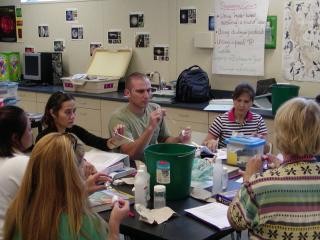Research
Phenomena-Questions-Models
Presented at NSTA National Conference 2017
3-dimensional learning is supported by lessons that employ phenomena, questions, and models. What is meant by these terms, what characteristics make them useful for instruction? Here you will find a pdf version of the presentation that investigates these critical features of science learning.
For more information on the presentation contact Arthur Beauchamp (acbeauchamp@ucdavis.edu) or Cindy Passmore (cpassmore@ucdavis.edu).
Research Conducted: CPEC Building Academic Literacy through Science
Theoretical Basis:
Effective science instruction includes opportunities for students to engage in inquiry, and to engage in scientific discussions to construct explanations (Gallas, 1995; Lemke, 1990; Rosebery, Warren & Conant, 1992; Wilkinson & Silliman, 2000). Participating in scientific discourse, however, requires specific discourse skills. Students need to know vocabulary as more than definitions; they need to understand the scientific concepts embedded in the words.









